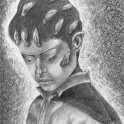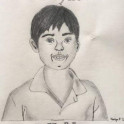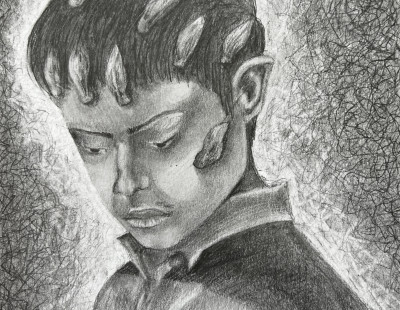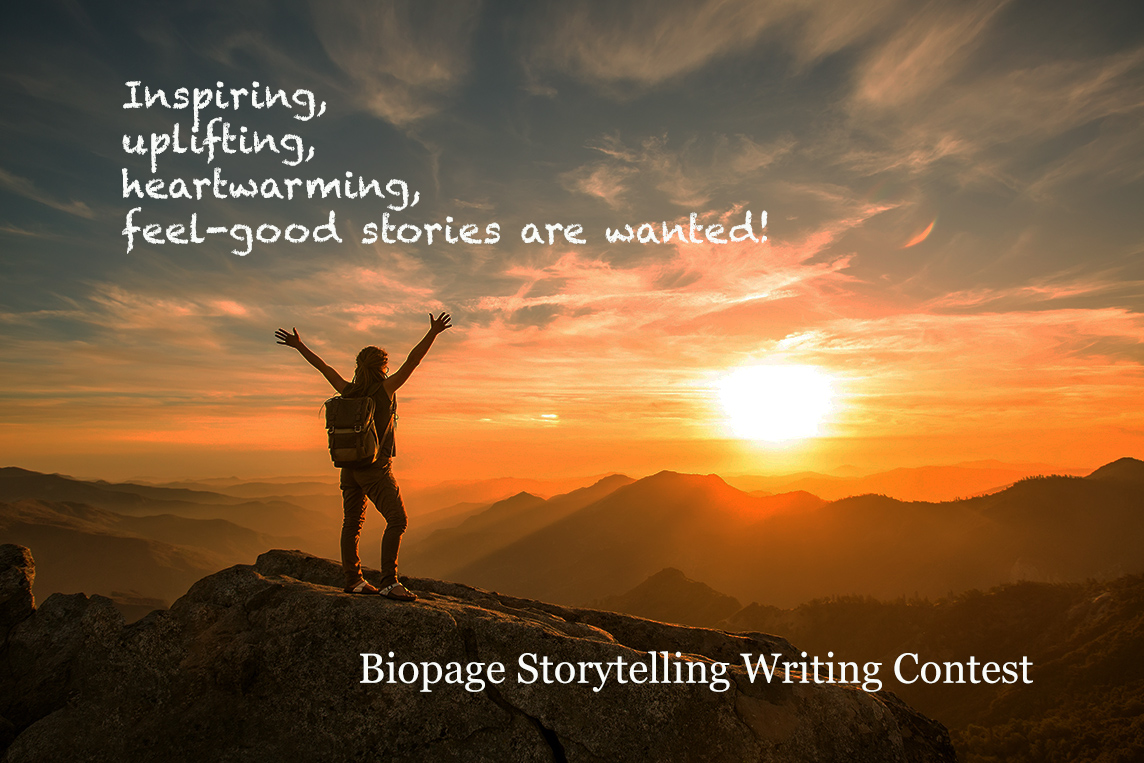-
Usernameshreyapoladia
-
Password
Leave password field empty to keep your existing password!
-
Confirm Password


Hi, My name is Shreya from Austin Texas. I enjoy reading and writing. I also enjoy painting and art.
I Belong... Where the love is Strong!
Nov 03, 2025 3 months agoI don't remember the day I was born, but my mom says sunlight danced through the blinds in the hospital room, as if celebrating something, maybe me. The nurses whispered the way people do when something unexpected enters, and they don't know what to do with it. They said I had Down Syndrome. Later, Autism, too. Toppings on a cake nobody ordered. But I wasn't the cake. I was the candle—burning, flickering, still alight. I was a child who didn't speak. My world was color and shadow, sound that clanged too harshly, light that pierced my eyes. I lined up cars and sang softly in corners. They called it “stimming.” I called it peace. My name is Raj. I've liked how it sounds all my life—short, round, easy to clap along to. But the world didn't wait for names like mine. It sped past playgrounds where kids pointed at the way I flapped or rocked. Adults whispered: special needs, disabled, he'll never... I could feel the room shift when I entered. Pity-eyes. Awkward smiles. Silence heavy enough to thunder. My labels defined my limits before I could show my potential. But even a crooked plant still reaches for the sun. For years, I didn't talk. But I spoke. I handed my mom a picture when I was thirsty. Pounded her hand when I was scared. Yelled when the world was too loud and no one turned it down. Everyone said I was nonverbal. But I had a voice: in my eyes, my drawings, my rows of stuffed animals facing the window to watch morning come. My sister noticed. Shreya: My lighthouse in a storm. She never tried to fix me; she came with me—into closets, under tables, into quiet spaces where the world couldn't find us. When I cried, she whispered stories. When I shook, she stayed. She didn't need words to understand. My silence wasn't empty; it was sacred. She wasn't just my sister. She was my translator. My grounding. My home. At school, labels followed me: intellectually disabled, low functioning. They hung on me like sweaters that didn't fit. Some teachers sighed; others looked away. They never saw how numbers made perfect sense to me, how piano keys felt like language, how I could feel my sister's sadness before she spoke. My wins weren't loud, but they were real. Then one day, Shreya began carrying books I couldn't read and notes with words like neurodiversity and inclusion. She gave speeches, built projects, told my story like it mattered. She called me her why. When she brought home a gold medal, her smile gleamed brighter than it. “Raj,” she said, “we're being heard.” Then darkness. My body dimmed, like someone turned down the light inside me. I stopped eating and walking. My words, few as they were, blew away like kites in the wind. Doctors said Down Syndrome Regression Disorder. Autoimmune Encephalitis. Hospitals blurred together. My sister carried my photo everywhere, her notebook full of questions no one else asked. She wouldn't give up. Sometimes, I heard her cry in the car. But when she came into my room, she smiled. “You still belong,” she whispered. “Even now. Especially now.” Then she did something beautiful. She started a Sibling Group for kids like her, with brothers and sisters like me. She called it SibShop. She made journals, painted kindness posters, built circles of laughter and tears. I watched from the window as children painted blue and orange spirals, sharing stories of love and belonging. Because of me. I didn't say anything. But I smiled. One golden Tuesday at the clinic, Shreya sat beside me, pencil behind her ear, writing for her project. I stared at her notebook, then at her. From deep inside, heavy as a river stone, I said, “Shreya.” She froze. Then tears. Then arms around me, heartbeat thudding against mine. “You're still in there,” she whispered. I was. I always was. I belong in this family. In this fight. In this world. Even when the world forgets me. Even when it measures worth in grades, in speed, in tidy words. My story isn't just mine. It's woven into everyone I've touched, especially Shreya. She thought I was her why. But truly—she's mine. On our fridge is a photo of us on a bench, a messy canvas between us. The sun we painted is too big for the sky. But it's beautiful. Because it's ours. Because it says, in quiet, painted words: We belong.
The "Imperfect"
Oct 26, 2024 1 year ago"Shreya will get into any college; she uses Raj as a ‘sympathy card.'" I overheard someone say this to my mom earlier this year. She calmly responded, “I get that it's hard to understand what it's like to have a family member with a disability…” My older brother, Raj, has Down Syndrome and Autism, making everyday tasks like brushing his teeth, eating, or making friends much harder—things most people take for granted. Despite this, Raj is resilient, warm, and hardworking. Though others may see him as “different,” we share a bond that has shaped me in ways few can understand. The words “sympathy card” stirred up emotions in me: anger, sadness, and hurt. It reminded me of our time in the Midwest, where our community embraced Raj without question. But when we moved to Austin, things changed. Suddenly, we became “that family” with a “different” child. People stared, and the warmth we once knew turned into distance. I just wanted people to see Raj as the remarkable person he is. One memory stands out. At a birthday party, the host mom handed goody bags to all the kids except Raj. She told my mom, "I wasn't sure if he would understand, so I didn't get him one.” I remember handing my bag to Raj, knowing it wasn't fair. Worse still, this mom worked as a special-needs aide and had once called kids with disabilities “psychopaths.” It made me wonder: how can someone in her role think this way? Where was the acceptance? Why was my brother unjustly branded “imperfect”? Then there was Raj's own birthday party. We invited families, but some parents hesitated. One even said, “You should only invite ‘kids like him'; other kids will be bored.” I couldn't help but question the true meaning of inclusion and why some parents resisted teaching their kids respect for people like Raj. Why was my brother again unfairly portrayed as "imperfect"? These experiences shaped me, making me question why people act this way. Are they unaware, rude, lacking empathy, or just ignorant? Each moment was a painful reminder of the prejudice Raj and our family faced. But it also taught me to become more understanding and resilient. As a family, we work hard to address misconceptions and stereotypes about Raj's condition. Even in elementary school, I was raising awareness about Down Syndrome and Autism. I'd give talks on Down Syndrome Day, pass out informational flyers, and join Buddy Walks. Through my non-profit, Art for a Cause, I used art to spread awareness and shared my story through writing, even co-authoring a book on Down Syndrome. My hope was to build empathy in my community and help people understand what growing up with a brother like Raj really meant. Despite these efforts, some people still accuse us of “playing the victim card.” Truly understanding our reality means living it, and most couldn't even manage a day in our shoes. As siblings, we carry unique burdens and face complexities beyond our years. I remember the helplessness I felt when Raj struggled during COVID-19, as he became quieter and more withdrawn. For over four years now, I have waited for him to call my name or play with me again—a hope that keeps me going despite the pain of missing him. As siblings, we often hesitate to add to our parents' already overwhelming responsibilities, keeping our own worries to ourselves. We experience a mix of emotions—worry, fear, sadness, and anger—all compounded by the biases we encounter. While many of my peers can't relate to this, we continue to grow stronger and more compassionate because of it. My goal is not to seek sympathy but to foster empathy - to shed light on my experiences and promote awareness and understanding. Growing up, I missed having a supportive community or siblings who understood what it was like to have a brother with a disability. This sense of isolation pushed me to turn my experiences into something positive. I became committed to helping other siblings facing similar challenges. To provide genuine support, I trained rigorously and became a certified facilitator for sibling workshops. This year, I launched my first sibling support group through Art for a Cause, giving siblings a place to feel understood and valued. Through my journey, I've learned that life isn't about achieving perfection or simply accepting imperfections. It's about celebrating our differences and finding strength within them. It's about choosing empathy over sympathy, offering understanding and kindness, and using our experiences to uplift others. Above all, it's about recognizing our shared humanity.
Every Cloud Has a Silver Lining...
Feb 28, 2024 2 years ago“Yay, No more School!” I heard my sister, Shreya, holler as she danced excitedly. I missed seeing her lately; she was always busy since Middle school started. “There is a lockdown because of a virus,” she said. I didn't really care because I was happy that everyone was home. It was like a dream come true! But soon, everything became harder. Whenever Mom said, “Raj, time to log into Zoom school/therapy,” I got nervous. I could feel my jaw clenching and my hands sweating. I loved school, but online school was hard for me, and slowly, I started “shutting down.” I missed seeing people, eating at restaurants, playing with friends, but most of all, I missed my routine. To make things worse, I had to wear a mask anytime I went outside. I hated the mask; it was hard to breathe. But Mom kept saying, “It keeps you safe.” My family always talked about something called COVID-19 that was causing all the changes. I was so confused; What was this disease? Why was everyone so scared? I didn't understand what it meant. There were so many questions swirling in my head. However, amid all this chaos, I was looking forward to only one thing, or so I thought... Every year, for summer break, we go to India, and I eagerly await it! But this year, Mom said, “Raj, we can't go to India because of COVID.” What?! I thought to myself. But we always go to India! That's not fair! It made me upset and anxious. Suddenly, my body felt a big void; I couldn't explain. I frowned at Mom and reached for the chewy tube that was hanging from my neck. I rubbed it against my fingers and moved it vigorously from my left to right hand. My chewy tube was my go-to fidget when it was hard for me to process things. I just stared in disbelief! Change has always been hard for me. Diagnosed with Autism and Down Syndrome, my brain is wired differently than typical kids. While I learn everything, I have my own pace and way of learning. Things are hard to understand sometimes, but I never quit, and most importantly, my family never quits on me. Certain things that typical kids “take for granted” are challenging for me. I like routine, and change throws me off-guard. This change of not going to India was one of them, and I felt a strong pain that I could not express. This virus was changing everything that I was looking forward to. I vaguely remembered the next few weeks. I withdrew into silence and lethargy with overwhelming sadness and anxiety. I disengaged from virtual therapy and learning. I remember my family cheering me with new toys, going on drives, taking me to the park, and trying fun things to make me happy. But it all seemed pointless; I only wanted to go to India. Recognizing the severity of my condition, my parents consulted a neurologist, who suggested a change of scenery to offer some relief. “Wake up, Raj, we are going on a beach vacation,” Shreya exclaimed. Usually, vacations make me happy, but this time, I was not thrilled. I dragged myself into the car. Before I knew it, we reached Padre Island. The next day, we went to the beach early. I was hesitant and clenched tightly on my chewy tube. Settling into a beach chair, I observed my family playing in the water, luring me into joining them. Yet, it was the serene melody of the waves, relentlessly kissing the shore, and the sight of birds gliding gracefully in the sky that captivated me. "Shall we build a sandcastle, Raj?" Shreya persisted, a question she asked each day until, on the fourth, I found myself nodding in agreement. Hand in hand, we approached the waves, stepping into the refreshingly cool waters—a welcome respite from the sun's relentless blaze and the scorching sand. Immersed in play, we leaped and splashed, each droplet of water igniting a spark of joy within me. That evening, when we went on the deck, the sky looked beautiful with deep orange, vermillion, purple, and blue. Eating my chocolate and Twix-flavored ice cream, I realized how beautiful Padre Island was! Before I realized the week was over, it was time to head back home. As our vacation concluded, I no longer felt sad or anxious; a sense of calm and readiness to return home had settled within me. I still had a lot of questions. I was still confused about the virus and wanted to visit my family in India. But I also knew that even if things change, my family is always by my side. I am learning that it's OK for things to change. My family helped me find my silver lining through the clouds of anxiety. So, on our drive back home, I asked my mom, “When is our next vacation?” Inspired by my brother Raj's story, I aim to voice the struggles and resilience of those with disabilities facing mental health challenges during COVID-19. It's crucial to shift from stigmatization to raising awareness about mental health. Awareness fosters acceptance, which paves the way for kindness, empathy, and support. So, let's support people-with-disabilities and help them focus on ways to promote good mental health and find their silver lining!
Where there is a Will, there is a Way
Oct 11, 2023 2 years ago“I empathize with your situation. I used to have a sibling with Autism until he outgrew it at 5...” Last year I was approached by a schoolmate, her words “used to” & “outgrew” lingered on my mind and prompted me to research Autism. Having a brother with a diagnosis for Autism and Down Syndrome, I feel extremely protective of him and people with disabilities. I have personally witnessed the difficulties my brother faces in performing even the simplest tasks that we often take for granted—like brushing his teeth in the morning, eating his food, getting ready for school, making friends, or completing his homework. Sadly, despite my brother's relentless efforts, which surpass those of any typical child, he faces more judgment than the average student. Year after year, he has to prove himself, whether it's for meaningful inclusion in school, making friends, achieving good grades, or pursuing employment opportunities. Despite all the challenges, we are very proud of my brother's accomplishments, he never quits and we never quit on him! The more I read and researched, the more my understanding aligned with what I initially believed – Autism is a condition that exists on a spectrum, not a disease that can be cured or outgrown. Throughout my freshman year, I frequently encountered situations where schoolmates demonstrated ignorance about Autism and other disabilities, even manipulating it for personal gain or simply lacking understanding. Witnessing these incidents left me feeling saddened by the prevailing ignorance and the need for greater awareness and acceptance of Autism and other disabilities in our community. During one such instance, I was approached by a classmate who said, “I wish I had your problems because then I could get into whatever college I wanted…” I thought to myself, “What problems? Having a brother with a disability is not a problem…,” I felt appalled by what was said but soon realized that there is a trend where students manifest mental health issues and invent sob-stories in an attempt to get into good colleges. Another example is one of my schoolmates who claimed to have Attention Deficit Hyperactivity Disorder or ADHD (without medical diagnosis) and even started diagnosing other students who don't have the condition. It is extremely annoying when students fake ADHD and other mental health issues to fit into the “quirky main character” aesthetic. All the experiences left me utterly astounded and deeply troubled. Numerous questions swirled in my mind. Why would some students stoop so low as to feign disabilities on behalf of their siblings? How could individuals' resort to such measures just to secure admission into prestigious colleges? Shouldn't our academic achievements be sufficient? Why do some find it acceptable to ridicule students with disabilities? How would they feel if they were subjected to such mockery? Suddenly I started getting flashbacks of incidents that I experienced growing up: The “never ending stares” of people at my brother whether we are at the restaurant, on a walk, at the airport, park, beach or just minding our own business. The apprehension and ignorance from the community to accommodate my brother's needs during community events, the indifference and lack of interest from parents of typical kids to instill the values and respect for people with disabilities in their children, the lack of meaningful inclusion for children with disabilities in the schools; there are so many experiences to share…I always wondered how I could transform the “never ending stares” into “friendly hellos”? The “ignorance” into “acceptance”? The “indifference” into “empathy”? Over the years, I have learned that altering people's perception & educating them is a great way of raising awareness & preventing stigmatization associated with disabilities. Awareness and education foster acceptance which can lead to kindness, empathy & support. My non-profit, “Art for a Cause” was born during COVID when I saw my brother struggle with social distancing. We painted together and created artwork to host my first Virtual Art Show. We donated the proceeds to promote awareness about DownSyndrome [ https://pitredeepali.wixsite.com/shreya-artshow ]. The response I got from friends, family, community, neighborhood & school was astounding. People were interested in my paintings but also genuinely cared about the cause. Through this process I have realized that art and painting have a remarkable power to bring people together: irrespective of their age, race, color, need, or ability. I am hopeful because with every painting you buy, we are one step closer in eradicating the myths and ignorance about disability. I am hopeful that my paintings can act as a positive catalyst to educate people, combat bullying, debunk myths, and erase derogatory language towards people-with-disabilities by fostering awareness, understanding and acceptance, in our homes, schools, and communities.


_124_auto.jpg)



_media.jpg)







